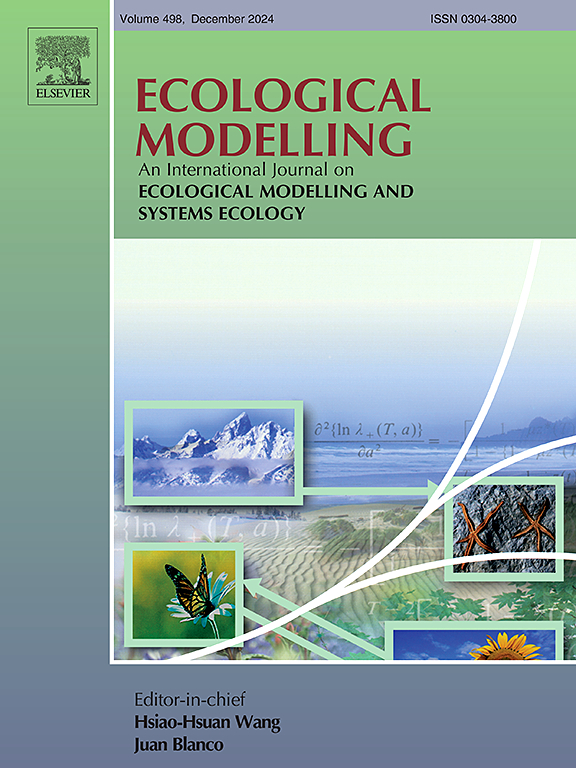Warming air temperatures alter the timing and magnitude of reservoir zooplankton biomass
IF 3.2
3区 环境科学与生态学
Q2 ECOLOGY
引用次数: 0
Abstract
Warming air temperatures are altering many physical, chemical, and biological processes in freshwater ecosystems. Process-based ecosystem models are important tools for predicting potential future changes to water quality due to warming by simulating complex ecological interactions. However, while previous studies have modeled climate-driven impacts on water quality (e.g., water temperature, dissolved oxygen, phytoplankton), few have included zooplankton, despite their critical role in freshwater ecosystems. Zooplankton functional groups can exhibit variable responses to warming temperatures, but the implications of these responses on freshwater ecosystems are not well understood. To understand the effects of warming on reservoir zooplankton and water quality, we configured and calibrated a process-based freshwater ecosystem model simulating three zooplankton functional groups and then applied multiple air temperature scenarios to explore ecosystem responses. We found that warming air temperature increased modeled rotifer biomass and decreased modeled cladoceran and copepod biomass. While the timing of annual rotifer peak biomass was not altered by warming air temperatures, annual copepod biomass peaks were delayed by 54–100 days within a year across warming scenarios. The timing of cladoceran biomass peaks was more variable in response to warming. Changes to the timing and magnitude of modeled zooplankton biomass were likely driven by changes in nutrients and phytoplankton, as we observed a trophic mismatch between phytoplankton and zooplankton biomass. These results highlight the importance of including zooplankton functional groups in process-based models when exploring the future effects of climate change on freshwater ecosystems, as changes in zooplankton communities can directly and indirectly alter ecosystem dynamics.
变暖的空气温度改变了水库浮游动物生物量的时间和数量
变暖的空气温度正在改变淡水生态系统中的许多物理、化学和生物过程。基于过程的生态系统模型是通过模拟复杂的生态相互作用来预测未来气候变暖对水质的潜在影响的重要工具。然而,尽管以前的研究模拟了气候对水质的影响(如水温、溶解氧、浮游植物),但很少有研究包括浮游动物,尽管它们在淡水生态系统中起着关键作用。浮游动物功能群对变暖的温度表现出不同的反应,但这些反应对淡水生态系统的影响尚不清楚。为了了解变暖对水库浮游动物和水质的影响,我们配置并校准了一个基于过程的淡水生态系统模型,模拟了三个浮游动物功能群,然后应用多种气温情景来探索生态系统的响应。我们发现,变暖的空气温度增加了模拟轮虫生物量,减少了模拟枝海和桡足类生物量。轮虫年生物量峰值出现的时间不受气候变暖影响,桡足类年生物量峰值出现的时间在不同气候变暖情景下延迟了54 ~ 100天。在对变暖的响应中,枝海生物生物量峰值的时间变化更大。模拟浮游动物生物量的时间和大小的变化可能是由营养物质和浮游植物的变化驱动的,因为我们观察到浮游植物和浮游动物生物量之间的营养不匹配。这些结果强调了在探索气候变化对淡水生态系统的未来影响时,将浮游动物功能群纳入基于过程的模型的重要性,因为浮游动物群落的变化可以直接或间接地改变生态系统动态。
本文章由计算机程序翻译,如有差异,请以英文原文为准。
求助全文
约1分钟内获得全文
求助全文
来源期刊

Ecological Modelling
环境科学-生态学
CiteScore
5.60
自引率
6.50%
发文量
259
审稿时长
69 days
期刊介绍:
The journal is concerned with the use of mathematical models and systems analysis for the description of ecological processes and for the sustainable management of resources. Human activity and well-being are dependent on and integrated with the functioning of ecosystems and the services they provide. We aim to understand these basic ecosystem functions using mathematical and conceptual modelling, systems analysis, thermodynamics, computer simulations, and ecological theory. This leads to a preference for process-based models embedded in theory with explicit causative agents as opposed to strictly statistical or correlative descriptions. These modelling methods can be applied to a wide spectrum of issues ranging from basic ecology to human ecology to socio-ecological systems. The journal welcomes research articles, short communications, review articles, letters to the editor, book reviews, and other communications. The journal also supports the activities of the [International Society of Ecological Modelling (ISEM)](http://www.isemna.org/).
 求助内容:
求助内容: 应助结果提醒方式:
应助结果提醒方式:


